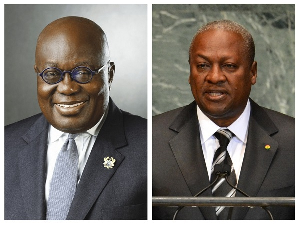Well, the news is out now so permit me to celebrate the life of, now, my former client Eva Lokko by reproducing this post from 13th February 2014. A brave woman, who took on the system and whipped it well and proper.
That is a life worth celebrating, and this life is poorer without her.
This isn’t a rant. This is the case of Eva Lokko. It is just one of the cases that show that probably Ghana isn’t worth dying for, particularly with respect to serving in public office.
Today, I reproduce extracts from a high court judgment, which convinces me, that until we stop the disgraceful way by which we remove public officers from office for political reasons, very few really talented Ghanaians will enter public office. It was done to Ms Lokko. Radio announcement to “PROCEED ON LEAVE.”
Farcical and specious allegations were made against her and bandied about on national radio and TV. She had no access to or control over the media. But she would not take it lying down. She summoned the steel ‘cojones’ to go to court and fight on principle (even though she knew she would never go back to the office), something many so-called men have shied away from. She won. And your tax monies were used to pay her damages and costs. Not much, just a total of 20,000 Ghana Cedis. But can we continue to afford this? A long read; but enjoy…
EVA LOKKO V. NATIONAL MEDIA COMMISSION & GHANA BROADCASTING CORPORATION (Suit No BMisc. 132/2006, High Court Judgment dated 2nd February 2012), Judgment of Dzakpasu J. ON THE CONDUCT OF THE AUDIT SERVICE: “Auditing by the Auditor-General in effect did take place but at the time she was under siege by some staff of the corporation demonstrating against her and there and then she was asked to proceed on leave.
By her evidence, the Auditor-General did issue a report but had to withdraw the report because her views on certain matters incorporated in the report were not sought before the issue of the report.
That the Auditor-General indeed withdrew his report is clearly evidenced in Exhibit BP. The withdrawal letter was very clear that because the plaintiff’s comments had not been sought, the said Audit Report could not be used for any purpose. All these pieces of evidence were not contradicted meaningfully by any evidence from the defendants. A little comment here.
How come the Audit Service could issue their report without the input of the plaintiff and this was done on the blind side of the Auditor General? Could such clear breach of established auditing practice be made inadvertently?” ON THE CONDUCT OF THE LOCAL UNION: “Louis Darko, the national chairman of the workers union testified for the 2nd Defendant.
I must say without any hesitation that his evidence exudes nothing but bias against the plaintiff such that it was not possible for me to conclude that he would not want the plaintiff back to the office. He told the court that the workers rose against the plaintiff when she started going against the Collective Agreement.
He alleged the plaintiff was financially mismanaging the corporation. None of these allegations did he substantiate. When asked in cross-examination whether he was aware that the plaintiff’s signature on one of the fraudulent cheques was found by the police to be a forgery, he said he is aware, but the workers are disputing that finding by the police.
In other words, they still believe that the signature on the fraudulent cheques is that of the plaintiff even though [the] witness admits that they don’t have any means or expertise of detecting signature forgery.
And on the arrest and interdiction of three of their colleagues in relation to fraud committed by the corporation, [the] witness admitted that the corporation went through the correct procedures for interdicting them but said they objected to the circumstances of their arrest by the police.
[The] witness did not elaborate on the circumstances of the arrest that they found objectionable. What is more surprising of the witness’ evidence is his further admission that they demonstrated against the plaintiff because she interdicted their four colleagues who were implicated in the fraud.
His evidence that some deductions were being made by the plaintiff from their salaries was put under scrutiny in cross-examination. The result of the cross-examination was [an] admission by the witness that some of the deductions were being made before the plaintiff came to lead the corporation.
Asked whether he had any evidence on the allegation that the plaintiff was declaring deductions from worker salary to government as profit, [the] witness said “no”. I believe it could be gleaned easily from his evidence why the demonstration against the plaintiff.”
ON THE ALLEGATIONS OF FINANCIAL MALADMINISTRATION AND MISMANAGEMENT MADE AGAINST EVA LOKKO: “Pitching the plaintiff’s evidence against that led by the defendants, I am convinced and accept the plaintiff’s evidence as regards the problems and difficulties she inherited in relation to management and finance of the corporation.
I will also find that her performance, despite the problems and difficulties she inherited, was indeed a strong indicator that the GBC was making a headway towards building a viable corporate body. The defendants have failed abysmally in establishing any of the several serious allegations they made against the plaintiff…
I find it highly surprising that such serious allegations and copiously well-particularised damages can be made by the defendant [and] prosecuted by their counsel without any supporting evidence. No evidence and no attempt were made at proving any of the wild allegations which had the potential of damaging whatever reputation the plaintiff had built for herself.
What then could be the reason or motive for the case the defendants sought to fight in this court? Was it just a collection of baseless allegations hurriedly gathered just to meet the plaintiff’s case in court? Surely, I have no hesitation [in] simply dismissing the counterclaim of the defendants as it relates to the allegations of financial maladministration and mismanagement of the 2nd defendant corporation by the plaintiff.”
ON THE LEGALITY OF THE ‘PROCEED ON LEAVE’ ORDER: “I will now deal with the issue of the legality of the order that she proceeds on leave, which she rightly interpreted was a dismissal. I say rightfully because of the manner of sending her off [from] the office and also the defendants refusing to respond to her request to come back to the office after the expiration of her leave period.
The defendants compelled her to go on leave against her wish. She wrote to the defendants that the period was not appropriate for her to go on leave because there were some critical programmes and projects to be dealt with. She was ignored.
Her office was barricaded and in fact, she was not to be seen anywhere near her office. And when the refusal to call her back to work provoked the plaintiff to go to court, her choice of the court for resolving the matter was given as the reason for not responding to her letter notifying the defendants of the end of her leave.
This was a letter which they had ignored far earlier than her entry to the court registry with her writ of summons. All these happenings point to nothing less than that the defendants dismissed the plaintiff and intended to dismiss her with maximum pain as the chief executive of GBC…
I have found that there was no financial maladministration that could be put at the doorstep of the plaintiff. This should have been known by the Board. What the board should have known and supported was the gradual inroad the plaintiff was making at solving the long-standing financial malaise of the corporation and given her the support, rather than what appears to be a directive of “proceed on leave” arising out of fright of workers’ agitation…
As for the workers’ agitation, it appears to me that from the evidence of Mr. Louis Darko, the defendants could not be serious when they asked the plaintiff to go on leave because of the ill-informed and self-centered workers agitation. For the Board should have known that the group of workers on rampage had no justifiable reason for the demonstration that self-preservation.
The allegation that the plaintiff was tampering with the conditions of service, matters personal to the workers, could not be established by any evidence neither the allegation that there was financial mismanagement. Self-preservation, also because they went on a demonstration in the protection of some of their colleagues who had been arrested by the police.
Now to the law on the directive to proceed on leave. The circumstances of this case make for an easy conclusion of this case on whether the defendants acted within the contract they entered into with the plaintiff as the head of GBC and/or the law on employment relations.
I cannot imagine the defendants failing to come to the aid of this sensitive state asset if there were signs of the imminent collapse of GBC, and the only reasonable way of saving this is to request that the plaintiff stands aside or takes her leave for an immediate solution to be found.
Why shouldn’t that request be made? It appears to me and it is my view that asking the plaintiff to proceed on leave would have fallen within reason and acceptable industrial relations if the board together with the NMC had entered into talks with the plaintiff why the need to for leave at that time.
If the happenings in the 2nd defendant were found by the defendants as unsatisfactory or explosive, nothing prevented the defendants from invoking paragraph 3 of the plaintiff’s appointment letter and terminating her appointment by paying her 3 months’ salary in lieu of notice of termination.
They chose not this mode but forced her out of office after shockingly asking her to proceed on leave with immediate effect.
And when she exhausted her leave the defendants refused to allow her back in office. The Labour Act by its section 27 demands that as much as possible, a worker shall be given 30 days’ notice before the date he is to commence his leave.
The circumstances of this case show that the defendants clearly breached this provision in the manner they compelled the plaintiff to go on leave. I will grant the plaintiff she claim that the defendants acted unlawfully when they directed that she proceeds on leave and within the circumstances of this case, I will find her removal tantamount to a dismissal.”
ON WHETHER SHE IS ENTITLED TO DAMAGES: “She has asked for damages for this breach by the defendants. The GBC is one of the ailing government bodies, such that its finances cannot be spared in such fruitless battles.
The Media Commission is funded from the taxes collected from all of us. Should a few commit all of us financially in such [an] offensive manner? Why can’t the perpetrators of the wrong pay the damages that the court's award in such cases and in this case in particular?...
That there was something wrong should not be farfetched because it could be deduced from the manner she was sent off the premises of the GBC to proceed on leave. There was no discussion of this issue with her; it was her secretary who broke the news to her that there was a radio announcement that she was to proceed on leave.
I don’t think if the defendants have the right to remove the plaintiff as the managing director, or have the right to ask her to proceed on leave, the manner of delivering the directive was in anyway acceptable in the civil atmosphere we are currently operating under the 1992 Constitution.
The little said about this the better. We should be growing away from authoritarianism, misuse of power entrusted to our care on behalf of the people and destroying the very few competent professionals we have without our social and administrative politics.
That the atmosphere in GBC during this period was permitted to fruit into such lawless removal of the plaintiff definitely would cast some shadow unto all other Boards. Should other Board members elsewhere court and insist on competence in the organisations where they are serving as Board members, or should they work according to the dictates of some few misguided tops if they are not to be embarrassed and sacked?
Probably it is the duty of the courts to frustrate such delinquent behaviours and give protection to government appointees like the plaintiff.
The delinquent will say, “Let’s sack him. He can go to court. Before the case in court ends it would not be possible for him to go back to the office.” I think the courts should find a better way of responding to this way of thinking than using state coffers to compensate the victim…
Earlier in this judgment, I asked why the perpetrators should not be held personally responsible for any damages that the court may award in such cases. [But] I had difficulty identifying the perpetrators of the wrongs committed in this case because several, whose names came up in the trial, particularly on documents tendered in court, did not have the opportunity to testify to clear their names…
I have not lost sight of collective responsibility of Board members but in certain cases, it should be possible for members to be identified individually for effective court orders to be made. But for these difficulties I was minded to make the award in damages which the plaintiff is entitled to against the perpetrators of the wrong committed against the plaintiff instead of payment from the public purse.
I am aware that such an order, by and large, would be a novel order not too common to make in our judicial set up. But it is an order worth making, inviting the apex courts to give practical meaning to the constitutional protection given to public servants as well as protecting the public purse draining to bail out appointees of the like we have encountered in this case. I was minded to also give the plaintiff back her seat but for the fact that her contract period has also expired.
Considering the fact that the plaintiff has had the opportunity to clear her name, in my view, in an admirably valiant manner, of the dirt intended to be smeared on her, and the fact that she has joined the crusade in the headship of a national political party (I take judicial notice of this fact) for the good governance of this country, which includes protecting these very same institutions from financial collapse, amongst others, I am minded to give her GH¢5000 general damages against each defendant. [And] Costs of 5000 Ghana Cedis should suffice for this case against each defendant.”











